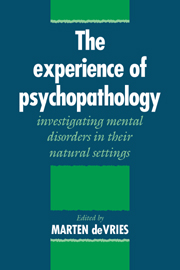Book contents
- Frontmatter
- Contents
- Foreword
- Preface
- PART I INTRODUCTION: THE EXPERIENCE OF PSYCHOPATHOLOGY
- PART II THE EXPERIENCE SAMPLING METHOD: PROCEDURES AND ANALYSES
- PART III EXPERIENCE SAMPLING STUDIES WITH CLINICAL SAMPLES
- PART IV THERAPEUTIC APPLICATIONS OF THE EXPERIENCE SAMPLING METHOD
- PART V PSYCHIATRIC RESEARCH APPLICATIONS: PRACTICAL ISSUES and ATTENTION POINTS
- CLOSING Looking to the future
- References
- List of contributors
- Index
Foreword
Published online by Cambridge University Press: 03 May 2010
- Frontmatter
- Contents
- Foreword
- Preface
- PART I INTRODUCTION: THE EXPERIENCE OF PSYCHOPATHOLOGY
- PART II THE EXPERIENCE SAMPLING METHOD: PROCEDURES AND ANALYSES
- PART III EXPERIENCE SAMPLING STUDIES WITH CLINICAL SAMPLES
- PART IV THERAPEUTIC APPLICATIONS OF THE EXPERIENCE SAMPLING METHOD
- PART V PSYCHIATRIC RESEARCH APPLICATIONS: PRACTICAL ISSUES and ATTENTION POINTS
- CLOSING Looking to the future
- References
- List of contributors
- Index
Summary
For one who has been among the pioneers of the systematic study of human experience in natural settings, it is enormously gratifying to greet this distinguished collection on The Experience of Psychopathology. My students and I at the University of Chicago began gathering electronic paper-induced responses from everyday life situations some 15 years ago. The Experience Sampling Method – or ESM – has since found numerous research applications. The psychiatric applications reported in this volume by Marten deVries and his colleagues span 10 years of work in the field and are without doubt some of the most important ones.
But, one might ask, how can the study of subjective experience help us understand psychopathology – let alone prevent or alleviate it? After all, now that departments of psychiatry at so many Universities are adopting progressively more molecular approaches, hoping to find mental health in the results of psychopharmacological, neurophysiological, or endocrinological studies, what room is there left for research that tries to understand molar behavior in actual social settings?
The chapters in this volume share a common assumption. It is that whether a person suffers or feels happy does make a difference – in fact, that this difference is the ‘bottom line’ of mental health research. Psychology and psychopathology cannot be fully understood at the level of chemical processes. The entire organism with its subjective states, operating in its real social and cultural context, must be taken into account if we wish to know what is right or wrong with it.
- Type
- Chapter
- Information
- The Experience of PsychopathologyInvestigating Mental Disorders in their Natural Settings, pp. xiii - xivPublisher: Cambridge University PressPrint publication year: 1992



